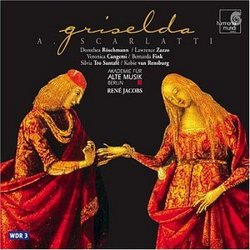Superb Recording of a Forgotten Masterpiece
Music lover | Philadelphia | 01/30/2004
(5 out of 5 stars)
"Scarlatti's Griselda received one performance in Rome and then basically disappeared until now. The libretto had been used many times over, after the manner of the times, by the likes of Bononcini and Vivaldi. It is a not particularly attractive story concerning the cruel and deceptive treatment of the heroine by her royal husband in order to prove her nobility of spirit to his subjects. However, it enabled Scarlatti to fashion a suprisingly beautiful and varied work.The music throughout is first-rate and revelatory. Themes start one way and then go off in directions that were not anticipated. The orchestration is rich and interesting. And there are an unusual, for baroque opera, number of ensembles; duets, a trio, and a quartet.This performance under Rene Jacobs is superb. All the singers acquit themselves well and sing with style and sensitivity. Roschman and Fink are particularly fine, but there are really no weak links. Orchestra is clear, crisp, and virtuosic. Recorded sound, packaging, booklet, all truly excellent. One of the best things to come out this year."
Delightful recording of a Baroque masterpiece
Eric Erwin | Northern Vermont | 11/24/2006
(5 out of 5 stars)
"Finding a complete recording of any of Scarlatti's operas would be treat to any lover of Baroque opera. However, to find one with such a skillful and talented cast of singers under the direction of the redoubtable Rene Jacob is a true treasure. This profound and delightful recording, made in 2000, recreates Alessandro Scarlatti's final opera and thus gives modern listeners insights into the culminative genius of this great composer of the Baroque period. Dorothea Röschmann and Lawrence Zazzo (a counter-tenor of tremendous musical sensitivity and talent) sing the music of the two main characters beautifully, and the supporting cast (Veronica Cangemi, Silvia Tro Santafé, Bernarda Fink, and a fine tenor Kobie van Rensburg) provide interpretations of great depth and vocal agility. Rene Jacobs and the Akademie für Alte Musik of Berlin are to be commended for the gorgeous interpretation of Scarlatti's score.This recording is well-edited: arias and recitatives are placed on their own tracks, allowing listeners to program their CD players with their favorite arias or skip the long recitatives if desired. Most of the arias are in the familiar Baroque da capo style, but require amazing vocal agility and sensitivity of emotion and rhythm on the part of the singers. The music is not as predictable as Handel's style, which adds to its charm and richness. Scarlatti's famous dislike of wind instruments is quite evident: nearly all of the characters' arias are accompanied by string instruments, giving them a subtle, plaintive, and melancholic tone. The recitatives are somewhat longer than a modern listener might be accustomed to, but nearly like arias in their emotional and melodic quality (Regula Rapp refers to them as "harmonically very complex"). The opera overture begins with a rousing fanfare of brass and strings, and the delightful journey does not end until the joyful strains of the final chorus. This recording is a "must buy" for veteran connoisseurs of Baroque opera, as well as for neophytes taking their first tentative steps into this genre."
A voice teacher and early music fan
George Peabody | Planet Earth | 10/30/2006
(5 out of 5 stars)
"'NOBODY KNOWS THE TROUBLE'S SHE'S SEEN (GRISELDA, THAT IS).
'Griselda' was first performed in Rome in 1721, the last of Alessandro Scarlatti's seventy or so operas. The cast consisted of five castrati and a tenor-on this recording the five castrati are replaced with two sopranos, two mezzo sopranos and a countertenor.
Apostolo Zeno fashioned the subject of Griselda into an opera libretto in 1701. Briefly, the plot is as follows: The King of Sicily (Gualtiero portrayed by Lawrence Zazzo-countertenor) marries Griselda (portrayed by Dorthea Roschmann-soprano)much to the chagrin of the people, because she is below his station. Consequently, they will not recognize their offspring as heir to the throne. Gualtiero goes back and forth between supporting his wife, then testing her by taking their one child away and leaving one with her. With his pretended acts of cruelty, he is no longer fighting for his own convenience as a husband, but (so to speak )battling alongside his unsuspecting wife for their recognition in society and the preservation of the couple's happiness. Another "test" is when he tells her that she must marry Ottone( a courtier portrayed by Silvia Tro Santafe) and she refuses,at which point he hopefully will have convinced his people that she is a worthy and virtuous woman. There are so many twists and turns in this plot that I leave it to you to listen to the opera and you will understand it all.
Jacob's cast is ideal! Dorothea Roschman's Griselda is always noble, belying this character's humble origins. Her voice is beautiful. Lawrence Zazzo (Gualitiero-countertenor), while on one hand seeming cynical and insensitive,in his 'asides' he must convince us of his inherent goodness, and he does! His countertenor is a firm instrument, and he uses it remarkably well.
Mezzo Bernarda Fink excels in her trouser role of Roberto. Veronica Cangemi's singing is first-rate. Kobie van Rensburg as Corrado has bites in his delivery and indeed has a very exciting operatic voice. I especially liked his Act II aria: "Agitata da fiera procella". Just glorious!!!
The singing is absolutely superb, and I find no fault with Jacob's pace and interpretation. The only thing I found somewhat annoying was the overabundance of treble voices; especially the two women who were portraying men. It was easy to determine Zazzo's sound because he has a truly Male quality even though he is a countertenor, but I don't think this type of thing can be avoided if one wants to be authentic in the casting. It's an exellent Scarlatti listening experience; it's quite dramatic, very melodious and has much variety of tempo and phrasing."

